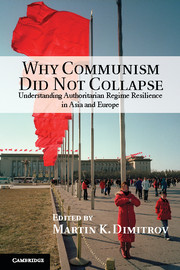Description
Why Communism Did Not Collapse
Understanding Authoritarian Regime Resilience in Asia and Europe
Coordinator: Dimitrov Martin K.
Addresses the durability of communist autocracies in Eastern Europe and Asia, the longest-lasting type of non-democratic regime to emerge after World War I.
Language: English
Subject for Why Communism Did Not Collapse:
Why Communism Did Not Collapse
Publication date: 08-2013
Support: Print on demand
Publication date: 08-2013
Support: Print on demand
Why Communism Did Not Collapse
Publication date: 07-2013
Support: Print on demand
Publication date: 07-2013
Support: Print on demand
Description
/li>Contents
/li>Biography
/li>
This volume brings together a distinguished group of scholars working to address the puzzling durability of communist autocracies in Eastern Europe and Asia, which are the longest-lasting type of non-democratic regime to emerge after World War I. The volume conceptualizes the communist universe as consisting of the ten regimes in Eastern Europe and Mongolia that eventually collapsed in 1989?91, and the five regimes that survived the fall of the Berlin Wall: China, Vietnam, Laos, North Korea and Cuba. The essays offer a theoretical argument that emphasizes the importance of institutional adaptations as a foundation of communist resilience. In particular, the contributors focus on four adaptations: of the economy, of ideology, of the mechanisms for inclusion of potential rivals, and of the institutions of vertical and horizontal accountability. The volume argues that when regimes are no longer able to implement adaptive change, contingent leadership choices and contagion dynamics make collapse more likely.
Part I. Reform and Resilience: 1. Understanding communist collapse and resilience Martin K. Dimitrov; 2. Resilience and collapse in China and the Soviet Union Thomas Bernstein; Part II. Ideology and Resilience: 3. Ideological erosion and the breakdown of communist regimes Vladimir Tismaneanu; 4. Ideological introversion and regime survival: North Korea's 'our-style socialism' Charles Armstrong; Part III. Contagion and Resilience: 5. Bringing down dictators: waves of democratic change in communist and postcommunist Europe and Eurasia Valerie J. Bunce and Sharon L. Wolchik; 6. The dynamics of contagion in the Soviet Bloc and the impact on regime survival Mark Kramer; Part IV. Inclusion and Resilience: 7. Authoritarian survival, resilience, and the selectorate theory Mary Gallagher and Jonathan Hanson; 8. Cause or consequence? Private-sector development and communist resilience in China Kellee S. Tsai; Part V. Accountability and Resilience: 9. Vietnam through Chinese eyes: divergent accountability in single-party regimes Regina Abrami, Edmund Malesky and Yu Zheng; 10. Vertical accountability in communist regimes: the role of citizen complaints in Bulgaria and China Martin K. Dimitrov; 11. Conclusion: whither communist regime resilience Martin K. Dimitrov.
Martin K. Dimitrov is an Associate Professor of Political Science at Tulane University, Louisiana. He is also an associate at the Davis Center for Russian and Eurasian Studies at Harvard University, Massachusetts and a research fellow at the East Asian Legal Studies Program at Harvard Law School. Dimitrov has previously taught at Dartmouth College and has held residential fellowships at the Fairbank Center for Chinese Studies at Harvard, the Davis Center for Russian and Eurasian Studies at Harvard, the Woodrow Wilson International Center for Scholars, the Notre Dame Institute for Advanced Study and the American Academy in Berlin. He is the author of Piracy and the State: The Politics of Intellectual Property Rights in China (Cambridge University Press, 2009).
© 2024 LAVOISIER S.A.S.
These books may interest you

Cuban Communism 135.96 €



